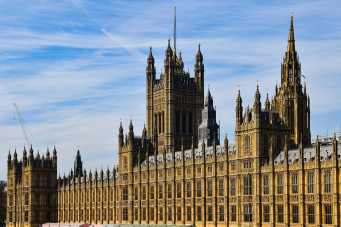
Sky Starts Falling?
There’s a lot going on with Sky at the moment. The company has featured heavily in the news recently, and it’s not been all that positive.
So what does the future look like for this behemoth of a broadcaster?
On the plus side, all 270 of the channels it carries will soon be available for the first time without the need for a satellite dish.
More negatively, Sky’s churn rate – the number of subscribers who decide to leave, which is a key metric and watched closely by the City – was 11.6 per cent in the last six months of 2016, compared with 10.2 per cent in the same period the previous year.
The reasons for recent coverage of the company are many and varied. We examine three of the stories surrounding the Isleworth-based broadcaster to weigh up its outlook:
- Sky’s recent public falling-out with Discovery
- The drop in the number of subscribers
- The rising cost of sports rights

Sky vs Discovery
In last month’s In The Frame…, we discussed the “explosive dispute” between Sky and Discovery, which almost led to the former refusing to carry the latter’s dozen channels.
Discovery claimed that Sky wasn’t willing to pay a “fair price” to carry its channels. Sky responded by arguing that Discovery’s price demand – £1 billion – was “completely unrealistic”.
But that figure was disputed by Discovery, who argued in a statement that it had been based on “alternative facts”, and said Sky pays less for its channels now than it did in 2006.
The falling-out was only narrowly averted at the eleventh-hour after a deal was reached by the two parties which meant that Discovery’s channels remained on the Sky platform.
Sky said, in an emailed statement of their own, from UK CEO Stephen van Rooyen:
The deal has been concluded on the right terms after Discovery accepted the proposal we gave them over a week ago. This is a good outcome for all Sky customers.
So why did this dispute occur?
John Bird, Principal Consultant at Futuresource Consulting, wrote on his company’s blog:
The disagreement was simple – Sky said Discovery’s viewing on its platforms has fallen and it did not want to pay what was being asked to renew their long term carriage agreement. Discovery said it is being paid less than it was 10 years ago, despite Sky subscription price rises and a claimed 20% increase in viewing of its channels on Sky platforms (the acquisition of Sky Germany and Italy in this period may well be a factor behind this assertion).
Later in the same article, he goes on to say that he believes the two main reasons were:
- The impact of on-demand on linear viewing
and
- The rising cost of sports rights
Subscriber numbers falling
Sky’s subscriber base is being eroded by intense competition from BT and Netflix and Jeremy Darroch, the broadcaster’s chief executive, blames the jump in churn rate on the “highly promotional” and competitive UK market “Churn is not where we want it to be,” he said, “but we’ve got a good set of plans to bring it down.”
One of those plans is to target, with a version of Sky Q delivered entirely over the internet, around two million UK homes that cannot or will not install a satellite dish.
The service will be distinct from the cheaper and more limited Now TV and, according to the Telegraph, “signals the start of a long-term shift away from satellite broadcasting”.
John Bird:
There are now approaching 6 million Netflix and 4 million Amazon Prime Video users in the UK (many taking both). As total TV viewing hours are relatively flat, it is inevitable that viewing of these services (as well as other alternative platforms like YouTube) will be taking share from traditional linear TV channels.
To combat the SVoD challenge, Futuresource notes that Sky itself has been migrating its proposition from linear to on-demand with Sky Q, Sky+, Boxed Sets, Sky Store, Sky Go and Sky Now.
Viewing of Sky Atlantic (which carries HBO content) is 75 per cent on-demand. From 2018 Sky will offer its full content portfolio on its online TV platform Sky Now, which offers both Subscription and PPV/Pass options.
Sky is also launching a programme to “reward loyalty and customer longevity in order to build even stronger customer relationships”.
Other measures intended to win over consumers include a new mobile network service offering savings to pay-TV households.
And then the story drifts back towards the Discovery dispute, as Darroch blames at least some of Sky’s drop in performance on those whose channels Sky carries:
One thing we will ask for is performance from our partners. The fact is [Discovery’s] share of viewing on linear [TV] has been in long-term decline. When you look to the on-demand world, Discovery performs at best a third it does in linear. They are not hitting big shows people pay for.
Premier League & Champions League bidding
Sky Sports retains an unwavering faith that live sport will always remain premium, a perspective highlighted in no small part by the company’s commitment to paying huge sums for broadcast rights as it competes on multiple fronts, but primarily with BT Sport.
Live sport has long been the focal point of the battle for profits, as service providers such as Sky and BT compete not just for viewers but fixed-line, broadband and mobile customers too.
Sky must balance an increase in churn with the financial hit brought about by paying for premium sports rights, but Darroch is keen to point out that the business is strong despite record costs to show top-level sporting action, most notably the Premier League:
In a year in which we are absorbing significantly higher programming costs, as a result of the step up in Premier League costs, our financial performance has been good.
The 71 per cent increase in the latest Premier League broadcast rights will cost Sky £5 billion over three years, but will owning them definitely deliver a return?
Last October, In The Frame… looked at a question the Guardian asked: “Is the unthinkable happening – are people finally switching the football off?”
The newspaper reported that “early season ratings for live Premier League matches on Sky Sports are down by a fifth”.
So are hugely expensive broadcast rights still worth paying for?
Consider, too, a new conundrum: where and how does social media fit in with the traditional model?
What happens when a ringside boxing fan streams the action from his seat?
Or when another fan streams action from his TV?
Very recently, Google and Bing, Microsoft’s search engine, announced that they’d make it harder for people in the UK to find pirated films and music and illegally stream sport events.
But that doesn’t cover – or stop – those using social media (or indeed Kodi boxes).
A quick search on one of those search engines bring unsurprising news of several tie-ups between major sports brands and social media companies – an indication of where things are heading:
- Facebook, MLB in talks to stream a game every week
- La Liga to show regular fixtures on Facebook Live
- And then of course there is Sky Sports’ own deal with Twitter to live-stream transfer ‘Deadline Day’
Even something like English Premier League football, which seemed like the most reliable stream of revenue for broadcasters, is no longer immune from this shift in consumption,” said Dror Ginzberg, the co-founder and chief executive of Wochit, the video creation platform.
With the potential takeover by the hugely wealthy 21st Century Fox on the horizon, Sky’s Darroch said his company’s strategy in the forthcoming struggle for Champion’s League rights – currently controlled by BT – wouldn’t be impacted by a takeover:
We go into all rights renewals this year in a good place,” he said. “The Fox approach has no effect at all on that. We have good options. We always look incrementally at where we might seek to invest and get better. We go into Champions League renewal from a position of strength across all our markets. We will bid according to the value we attribute to [those] right[s].
Ginzberg:
Bottom line? We’re going to see audiences fragment even further and traditional broadcasters will likely bear the brunt of this trend. Increased collaboration and partnerships are potential avenues with these new rivals for broadcasters may help to stem the tide. However, given how on-demand services have taken off so spectacularly, there might not be much incentive for them to give a helping hand to ailing broadcasters.

Netflix, Paramount and Warner Bros.: What the Deal Means for the Broadcast and Production Industry

How the Employment Rights Act 2025 Is Reshaping the Freelance Market
